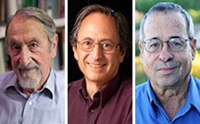Three US scientists win Chemistry Nobel
10 Oct 2013
Three US scientists share the 2013 Nobel Prize for chemistry for pioneering work on computer programmes for simulating complex chemical processes that have revolutionised research in areas from drugs to solar energy.
 |
| Martin Karplus, photo © Harvard University. Michael Levitt, photo: S. Fisch. Arieh Warshel, photo: Wikimedia Commons |
The Royal Swedish Academy of Sciences has decided to award the Nobel Prize in Chemistry for 2013 to Martin Karplus, Michael Levitt and Arieh Warshel, ''for the development of multiscale models for complex chemical systems,'' the Nobel Prize committee said in a release.
Where chemists once used to create models of molecules using plastic balls and sticks, the modelling is carried out using computers now.
In the 1970s, Martin Karplus, Michael Levitt and Arieh Warshel laid the foundation for the powerful programmes that are used to understand and predict chemical processes.
''Computer models mirroring real life have become crucial for most advances made in chemistry today,'' the release pointed out.
Since chemical reactions occur at lightning speed, and, in a fraction of a millisecond, electrons jump from one atomic nucleus to the other.
Classical chemistry has a hard time keeping up and, now, it has become virtually impossible to experimentally map every little step in a chemical process.
This year's Nobel Prize in chemistry has gone to the three scientists who let computers unveil chemical processes, such as a catalyst's purification of exhaust fumes or the photosynthesis in green leaves, through innovative methods, the Nobel Prize committee said.
''The work of Karplus, Levitt and Warshel is ground-breaking in that they managed to make Newton's classical physics work side-by-side with the fundamentally different quantum physics.
''Previously, chemists had to choose to use 'either or'. The strength of classical physics was that calculations were simple and could be used to model really large molecules. Its weakness, it offered no way to simulate chemical reactions. For that purpose, chemists instead had to use quantum physics. But such calculations required enormous computing power and could therefore only be carried out for small molecules,'' the committee pointed out in its release.
''This year's Nobel Laureates in chemistry took the best from both worlds and devised methods that use both classical and quantum physics.
''For instance, in simulations of how a drug couples to its target protein in the body, the computer performs quantum theoretical calculations on those atoms in the target protein that interact with the drug. The rest of the large protein is simulated using less demanding classical physics.
''Today the computer is just as important a tool for chemists as the test tube. Simulations are so realistic that they predict the outcome of traditional experiments.''
Martin Karplus, a US and Austrian citizen, born in 1930 in Vienna, Austria, is currently Professeur Conventionné at Université de Strasbourg, France and Theodore William Richards Emeritus Professor of Chemistry, Emeritus at Harvard University, Cambridge, US and holds a Ph.D from California Institute of Technology US.
Michael Levitt, a US, Brittish and Israeli citizen, born in 1947 in Pretoria, South Africa, is currently Cahill Professor in Cancer Research at Stanford University School of Medicine, US and holds a Ph.D from University of Cambridge, UK.
Arieh Warshel is a US and Israeli citizen, born in 1940 in Kibbutz Sde-Nahum, Israel, is currently Distinguished Professor at University of Southern California, US and holds a PhD from Weizmann Institute of Science, Israel.
The prize amount of SEK 8 million ($1.23 million)will be shared equally between the three Nobel Laureates.


















